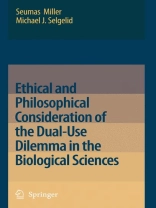What Is the Dual-Use Dilemma? The so-called “dual-use dilemma” arises in the context of research in the biological and other sciences as a consequence of the fact that one and the same piece of sci- tific research sometimes has the potential to be used for harm as well as for good. A dual-use dilemma is an ethical dilemma, and an ethical dilemma for the researcher (and for those who have the power or authority to assist or impede the researcher’s work, e. g. , governments). It is an ethical dilemma since it is about promoting good in the context of the potential for also causing harm, e. g. , the p- motion of health in the context of providing the wherewithal for the killing of in- cents. It is an ethical dilemma for the researcher not because he or she is aiming at anything other than a good outcome; typically, the researcher intends no harm, but only good. Rather, the dilemma arises for the researcher because of the potential actions of others. Malevolent non-researchers might steal dangerous biological agents produced by the researcher; alternatively, other researchers—or at least their governments or leadership—might use the results of the original researcher’s work for malevolent purposes. The malevolent purposes in question include bioterrorism, biowarfare and blackmail for financial gain.
İçerik tablosu
Experiments of Concern.- The Ethics of Dual-Use Research.- Dissemination of Dual-Use Research Results.- Options for the Regulation of Dual-Use Experiments and Information.












